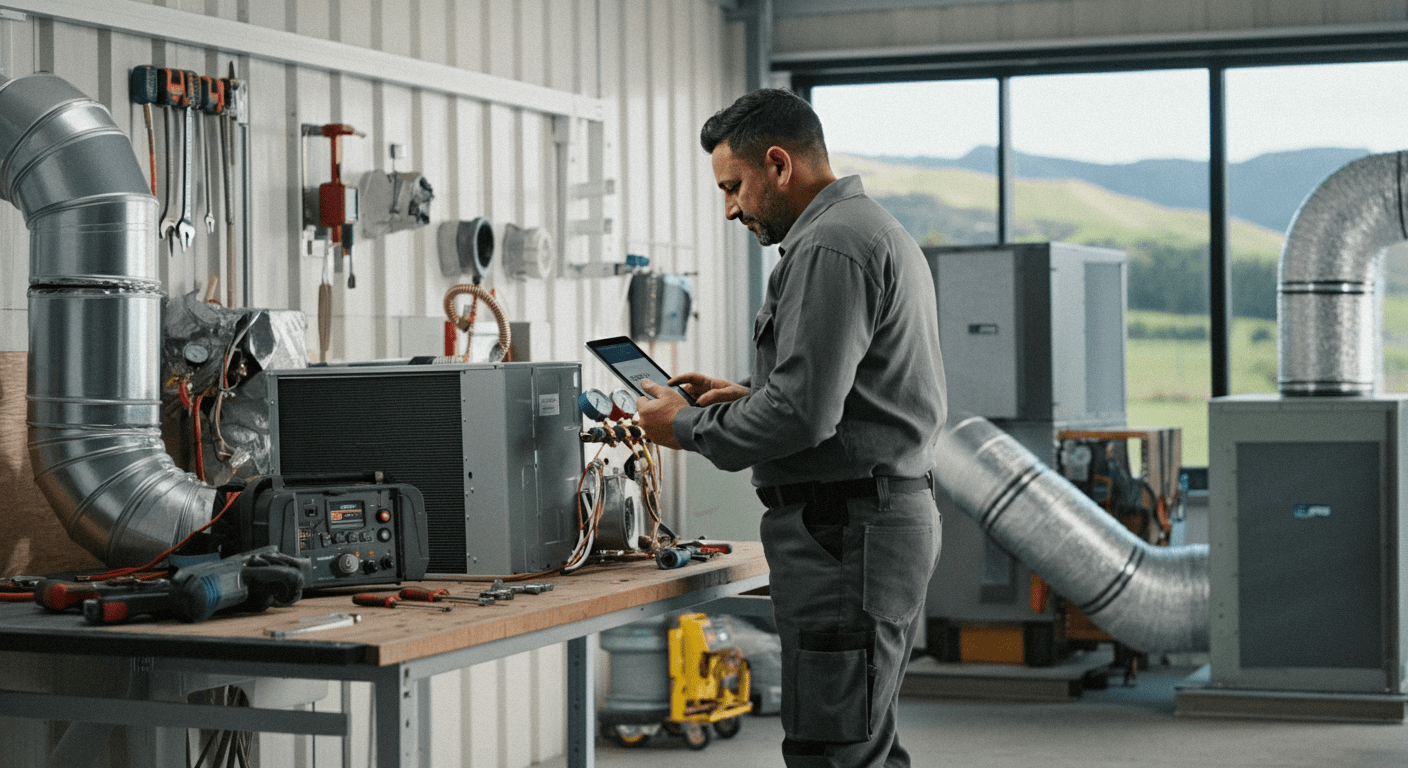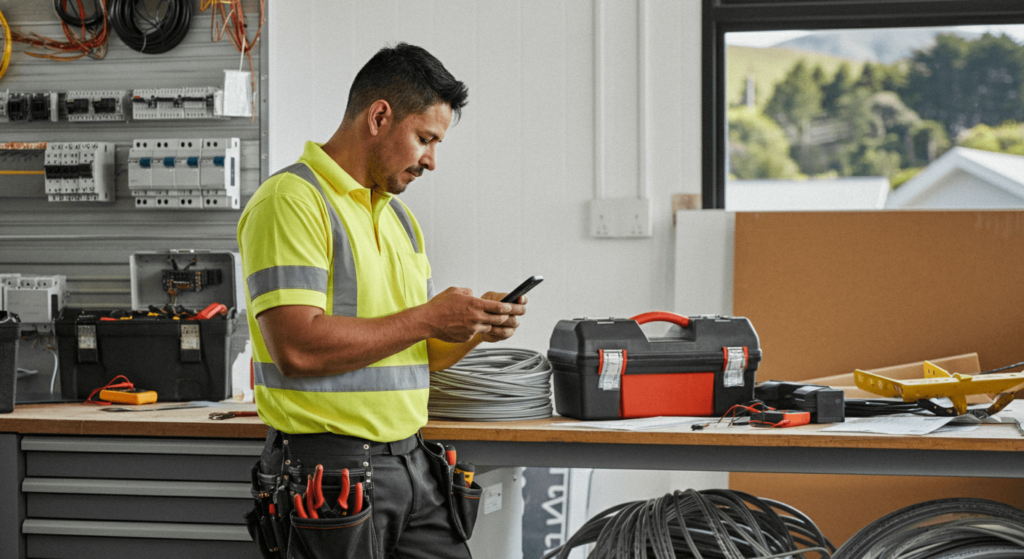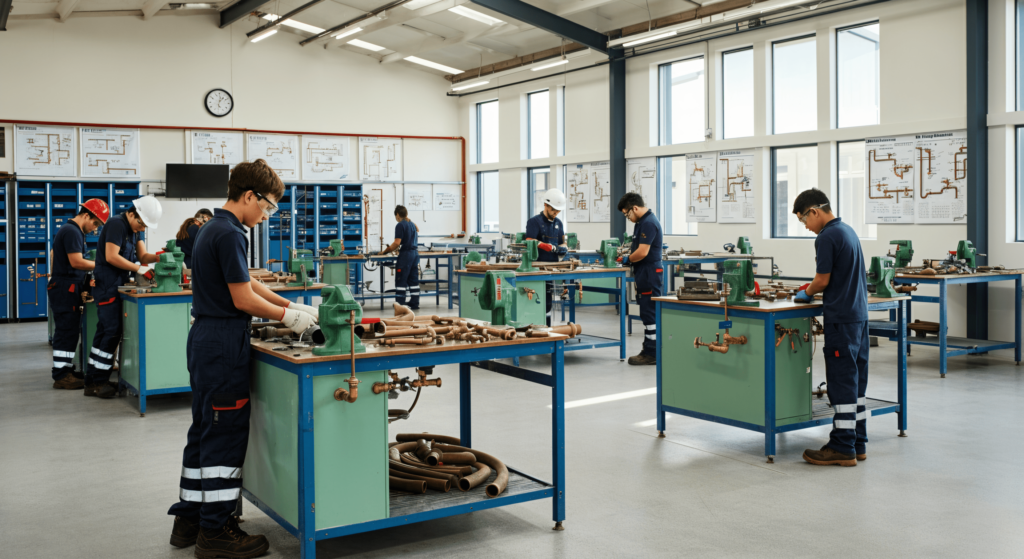Air conditioning and Refrigeration Mechanics, commonly known as HVAC technicians in Australia, are integral to maintaining comfort and functionality in various environments. Their expert skills cover both residential, commercial, and industrial facilities as they maintain uninterrupted operation of heating, ventilation, air conditioning, and refrigeration systems. This profession is not only vital for climate control and energy efficiency but also offers competitive remuneration influenced by factors such as experience, location, and specialisation. This guide explores the HVAC Technician’s Salaries, their tasks, and the career paths they can follow in Australia.
General Salary Information for HVAC Technicians
HVAC technicians earn a median weekly pay rate of AUD 2,019, which equates to approximately AUD 98,800- 104,988 annually, but this may vary based on experience and location.
Salaries can vary significantly based on experience:
- Entry-Level (0-3 years): Average Salary: AUD 68,000 – AUD 88,000
- Mid-Level (3-5 years): Average Salary: AUD 85,000 – AUD 105,000
- Experienced (5+ years): Average Salary: AUD 93,804 – AUD 115,465
Specialised Roles and Their Salaries
- HVAC Mechanics: Approximately AUD 66,000 – AUD 73,000.
- Refrigeration Technicians: Approximately AUD 83,000 – AUD 100,000.
- Project Engineers: The average salary can reach AUD 140,000, depending on the complexity of the managed projects.
City-Specific Salary Table
The following table summarises average salaries for HVAC technicians across various Australian cities:
City Average Annual Salary
| City | Average Annual Salary |
| Sydney | AUD 95,000-115,000 |
| Melbourne | AUD 97,000-105,000 |
| Brisbane | AUD 90,000-100,000 |
| Perth | AUD 95,000-110,000 |
| Adelaide | AUD 90,000-100,000 |
| Tasmania | AUD 81,000-97,000 |
These HVAC technician wages reflect variations due to local demand and cost of living.
Factors Influencing HVAC Technician Salaries in Australia
- Experience Level: The amount of experience controls the earning potential for technicians.
- Geographic Location: HVAC technical salaries differ according to regional locations because urban markets such as Sydney and Melbourne pay better due to higher job demand and living expenses.
- Education and Certification: Higher education levels correlate with better salaries. Technicians with diplomas or degrees can earn significantly more than those with only a high school diploma.
- Specialisation: Technicians with specialised skills (e.g., commercial refrigeration or energy efficiency) can command higher salaries than generalists.
- Industry Demand: Demand for HVAC services, influenced by climate and construction trends, affects salary levels. Locations with severe weather and quick developmental growth pay technicians at higher rates.
- Employer Type: Larger companies or those in specialised industries often pay more than smaller firms or less specialised roles.
Job Responsibilities
HVAC technicians are responsible for a variety of tasks, including:
- Professional installation of HVAC systems relating to specifications takes priority.
- HVAC technicians monitor existing equipment by inspecting maintenance standards and performing system repairs.
- The ability to diagnose refrigeration system malfunctions with the skill to exchange broken components becomes necessary.
- Checking systems for proper fluid and gas fillage, along with leak detection, is one responsibility.
- Professionals calibrate system controls to achieve their best performance outcomes.
According to recent data, approximately 26,100 HVAC technicians are employed in Australia. The median age of workers in this field is 35, and the workforce is predominantly male (with only a 1% female share).
Education and Qualifications
To become an HVAC technician in Australia:
- A successful candidate must hold an AQF Certificate III in Airconditioning and Refrigeration.
- Professional teaching through on-the-job training has become necessary; workplace experience usually requires at least two years or more.
- Alternative workplace training has the power to replace traditional certifications.
Overview of HVAC Apprentice and Career Pathway
The wages for HVAC apprentices depend on their training stage and age:
- First Year: Approximately AUD 20,000 – AUD 30,000 per year.
- Second Year: Approximately AUD 30,000 – AUD 40,000 per year.
- Third Year: Approximately AUD 40,000 – AUD 50,000 per year.
Apprentices typically receive structured pay increases based on time served or competency achieved.
Key Responsibilities of HVAC Apprentices
- Installation and Assembly: Apprentices assist during the installation of air conditioning units and refrigeration devices.
- Maintenance and Repair: Stage apprentices learn to execute basic maintenance operations, which include filter cleaning, refrigerant checks, and maintenance of replaced components.
- Troubleshooting: Apprentices develop the ability to troubleshoot issues with HVAC equipment.
- Understanding of Refrigeration Principles: They study refrigeration principles, including refrigerants’ properties and the mechanics of cooling cycles, which are crucial for effective system operation.
- Electrical Knowledge: Apprentices gain foundational knowledge in electrical systems related to HVAC equipment.
- Safety Protocols: Emphasis is placed on safety practices to prevent accidents while working with potentially hazardous materials and equipment.
- On-the-Job Training: Apprentices work under the supervision of experienced technicians.
- Classroom Learning: Regular classroom education supports on-the-job training by providing students with information about HVAC system technical fundamentals.
To become an HVAC apprentice, individuals must complete a Certificate III in Air Conditioning and Refrigeration, a nationally recognised qualification. The apprenticeship typically lasts 3 to 4 years, during which apprentices are paid while learning and working.
Once licensed, HVAC technicians can pursue these various career opportunities:
- Residential HVAC Technician: Focus on home installations and repairs.
- Commercial HVAC Technician: Providing technical services to companies with significant industrial and business HVAC systems.
- Maintenance Technician: Conduct regular checks and servicing of HVAC systems.
- Specialisation Options: Technicians may specialise in areas such as commercial refrigeration or energy efficiency, leading to higher earning potential.
The role of HVAC technicians in Australia is indispensable, with opportunities for growth, attractive salaries, and high demand across diverse sectors. By acquiring the necessary qualifications and gaining hands-on experience, individuals can embark on a rewarding career path in this ever-evolving field. Whether starting as an apprentice or advancing with years of expertise, HVAC technicians play a pivotal role in shaping Australia’s built environment and meeting the nation’s climate-control needs.




